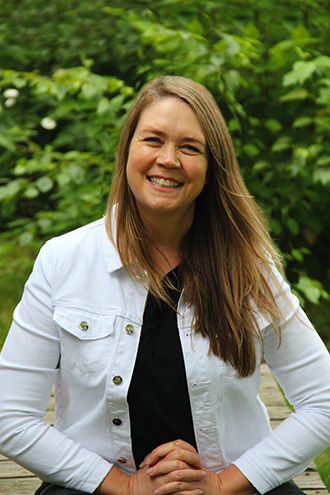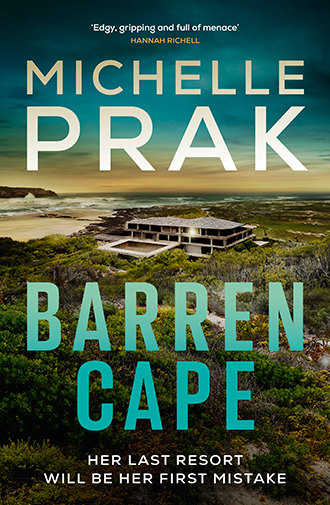- connecting our global alumni network
24 June 2025
PR professional turned thriller author – Michelle Prak's story
With a career spanning over three decades in PR, social media, and politics, Michelle Prak has always been adept with words. In 2023, she channeled her storytelling skills into her debut thriller, The Rush, with her follow-up, Barren Cape, released last month. Beyond fiction writing, Michelle imparts her expertise teaching communications at UniSA and was named a Fellow of the Public Relations Institute of Australia (PRIA) in 2019. She holds several communication qualifications from UniSA: Bachelor of Arts (Journalism), Graduate Certificate in Communication Public Relations, and Master of Arts (Communication Management).

We sat down with Michelle to discuss her evolution as a writer, her path to publication, and how her time at UniSA helped shape the storyteller she is today.
You’ve been writing in some way or form since you were a child, what role did your time at UniSA play in shaping your writing?
“I studied at UniSA back in the late 80s, graduated with a journalism degree in 1991 and that journalism degree itself had a massive impact because I still take all those principles I learned through my writing.
That journalistic learning still has a flavour with my fiction writing, for better or worse. It means I have a certain style. It’s a little bit spare or some people might call it stark, or to the point, in these thrillers that I write because it was drilled into me. You have to get to the point to have clarity of writing. Especially with things like dialogue in my books, I like to have very little fluff around dialogue. It’s almost like a script.
It is really useful to have that sharp kind of writing style, but at the same time the journalism degree drilled into me to write with brevity, to be really succinct and short and that has been an issue when trying to write a novel. My novels do tend to be on the shorter side and when I draft, I have to go back and tell myself to relax and get into the writing a little bit more.
It's the opposite problem to a lot of authors who might write tens of thousands of words more than they need and then they cut back. I'm finding that I need to expand and it's very much the result of my journalism degree.”
You spent several years working in PR before publishing your first novel — what gave you the confidence and motivation to take fiction writing seriously?
“The motivation was just reminding myself that when I was a child, I wanted to be a novelist. But it wasn't until I was approaching a milestone birthday that I reminded myself again ‘you've only got so many years on the planet, remember you wanted to be an author. When are you going to? Get to the keyboard and try to do this thing’.

I'm not sure about the confidence — part of it was decades of writing even though that it wasn't fiction writing. If you work in PR and communications, you're writing all the time and your writing is also picked apart by a lot of other people, or you collaborate on your writing, and you’re used to having feedback and edits. That is really handy when writing in the fiction world.
The other thing that motivated me is that since childhood I felt that I would eventually be a writer. It's just a natural part of me that was nurtured by teachers in primary school and in high school as well.
I hate using words like this, but it seems to be my fate that it would happen and also being such a voracious reader who reads all the time and have done since I was young, I've just felt that I'm a natural part of that world and it's just made sense that eventually I tried to write books as well.”
After self-publishing, you later transitioned to a literary agent and traditional publishing. What led to that decision, and what did you learn from the process?
“It wasn't so much that I made a decision to go to traditional publishing — it’s always been the A game, the ultimate, for a lot of authors. You want to be in a traditional publishing house where you have that team and there is a network of experts around you, they know how to get your book into stores, however that's so competitive.
I'm also an impatient person and that's what led to me self-publishing three books. With the first self-published book, I had pitched it to agents, I pitched it to publishing houses, but I couldn't get any yeses. Having come from a consulting background, and I was running my own small consultancy at that time, I had the confidence to say ‘well I'll try publishing myself because I know promotions, I know some creative elements, I know how to contract freelancers and build my own team that can produce a professional looking book.’ I did that with three novels and that was a fantastic experience, but it was always still a dream to be traditionally published.
Self-publishing is a very expensive hobby and it's like being another small business. It's just so many moving parts and it's time-consuming. So I wrote a thriller and pitched that to an Australian agent who took it on in 2023 and that brought me into traditional publishing.”
What was the biggest challenge in getting published, and how did you push through it?
“One of the big challenges is to stay motivated and not to give up. You've just got to have some faith in yourself that you are going to get a yes.
One of the things that made me more comfortable was I knew I'd spent a year and a half on The Rush. I drafted a dozen times and because I read so widely in my genre, I knew what the standard was and that gave me a grounding of confidence.
And it was a little bit of nothing to lose too. Why not? Keep trying you might get a rejection, but just keep going. It's happened for other people, why won't it happen for me? Those were the thoughts that kept me going.”
What advice would you give to our UniSA alumni community with creative ambitions?
“I think being a part of your artistic community is really important.
For example, I was a member of Writers SA and I'd go to their networking events, I'd go to workshops and for years I did writing workshops online and I’m a recent member of Sisters in Crime Australia.
With social media, I was following other writers, interacting with them, and all of that means that you're learning, you're hearing their stories, and you know what to expect. You know what sort of bars you might have to jump over; you know the realities of that industry but also you can be inspired and find that support like any networking group.
So a big piece of advice is to find your people and I’d class myself as an introvert as well, so it took a lot for me to get out of the house and go to an event and introduce myself to people, but it's so worth it because all these groups are warm and welcoming and there's so many benefits.”
How has your definition of success evolved since graduating — and what does it look like to you now?
“Like a lot of people, I have a definition of success for my personal life and a definition for my professional life and it has all changed as I’ve grown older, but I'm also aware that my definitions of success do change depending on what privilege I have now and the different position I'm in.
For example, when I first studied at UniSA I moved from Whyalla to Adelaide all by myself without any parental help and survived on Austudy. When I was in university for the first time and when I graduated, my definition of success was having a roof over my head and being able to feed myself.
That was so much of an imperative for me, that's one of the things that kept me from going into creative writing because I knew that it wasn't well paid — and it still isn't well paid — and for me I needed to have a stable income and a ‘sensible career’ so that's what led me to PR. I pushed fiction writing to one side and I wasn't able to come to it until later in life because then I had the privilege. I own a house; I've brought up my kids and now I can relax a little bit.
So my definition of success has changed, but now for me it is I have lived that childhood dream, I’ve published a few books and seeing my name on a library bookshelf, that's the ultimate success.”
Finally, what’s next — another book in progress, or something different on the horizon?
“I won't try something different, I’m in my happy place now.
I've written book three and I'm just hoping to hear back from my publishers soon regarding the plan for it. I think it's more action packed and fast paced than my first two books. It's a little different, it's more entertaining and fun because The Rush and Barren Cape examine societal issues, but this one is more of a rollicking ride! There are journalistic themes in book three as well, I've got a young journalist character so I'm really looking forward to that.
At the same time, I'm also really grateful that I've got online tutoring work at UniSA so that fits in really well with the writing. I feel like I've got this nice steady ship now. What's next for me is hoping that this continues for a few more years, I definitely want to stay in the thriller writing world.”




